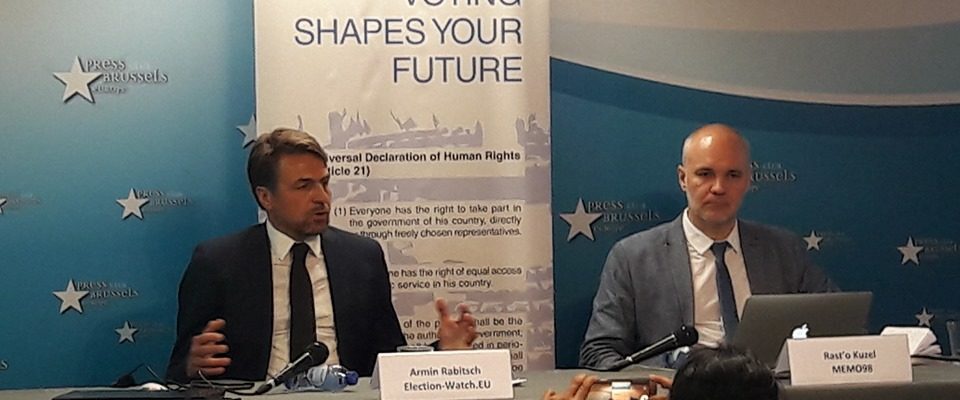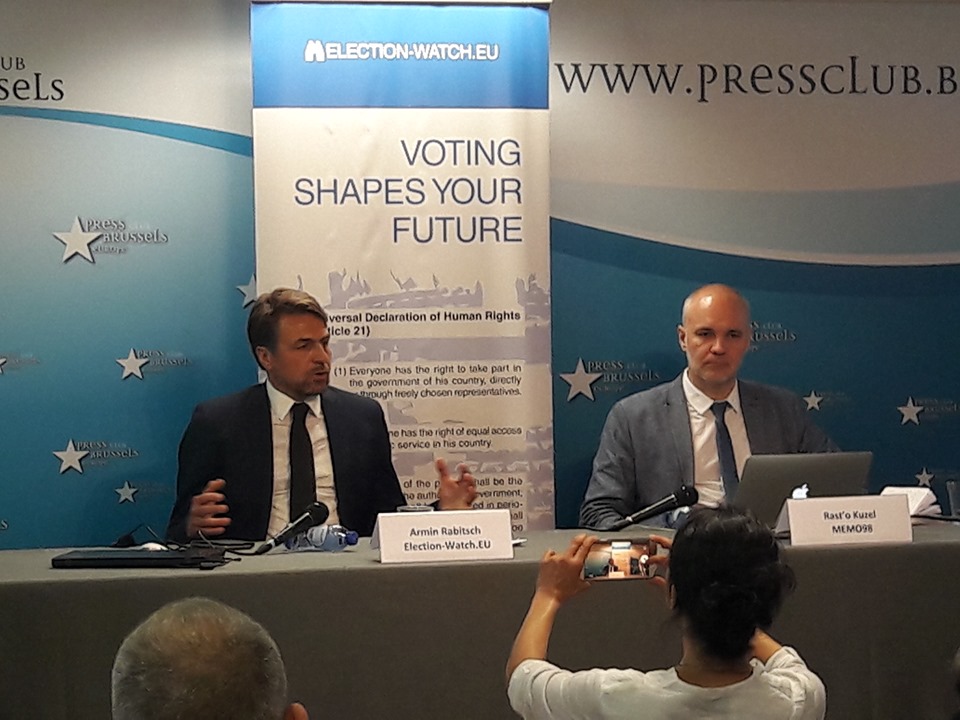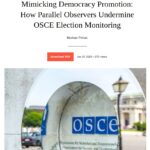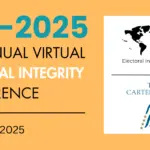
Election-Watch.EU Election Assessment Mission releases preliminary statement at Press Conference in Brussels

Election-Watch.EU held a press conference on Tuesday, 28 May at 11.00 hours at the Press Club Brussels Europe to present its preliminary findings and conclusions of the Election Assessment Mission to the European Parliament Elections 2019.
Election-Watch.EU was joined by Rast’o Kužel from MEMO98, a specialist media-monitoring organization known for its research of media during elections. MEMO98 presented its preliminary findings of its social media monitoring of the European Parliament elections.
Click here for the video coverage of the press conference
Brussels, 28 May 2019: For the first time, European Parliament elections were observed by a comprehensive Election Assessment Mission with 28 national chapters, comprising 65 international election experts and observers, as well as seven like-minded citizen election observer organisations. The Mission focused on specific areas to evaluate the coherence of the EU Member States’ electoral processes. These areas included the right to vote and the right to stand as a candidate, electoral calendars, voter registration, campaign finance, social media regulation, and participation of persons with disabilities. The Election Assessment Mission followed established election observation methodology, used international standards and regional human rights commitments as references, and has been carried out on a pro bono basis across the EU.
The 23 to 26 May European Parliament elections are one of the biggest democratic events worldwide, with over 426 million citizens eligible to vote, and a total of 539 lists and 15,221 candidates in all 28 EU Member States. The campaigns for the European elections have become decidedly more active than in the past, with a greater European dimension, positively resulting in an increased turnout over 50 per cent across the EU. The European citizens could choose from a broad political spectrum in a largely genuine competition, with populist messages in some Member States. In Hungary in particular, the electoral contest did not take place on a level playing field, with limitations on media freedom.
Key campaign topics included immigration, the environmental crisis, and euroscepticism. The topic of Brexit became less dominant once it was clear that the UK would participate in the elections. In many Member States, the competition for votes remained a test for national politics rather than a contest for representation at European level. The ‘Spitzenkandidaten principle’ was introduced in 2014 to enhance the transnational character of the process. Despite considerable efforts by European political parties, their lead candidates remained little known, as the parties themselves.
The diversity of electoral regulation and practice across the EU has demonstrated both the richness and complexity of the European electoral heritage and that electoral processes would benefit from greater cohesion. Electoral reforms, including the introduction of transnational lists and a common minimum voting age of 16, either did not find a majority in the outgoing European Parliament or were not supported by the European Council.
Election-Watch.EU aims to contribute to greater European electoral cohesion and presents its preliminary findings with regard to four interrelated criteria: equality, inclusion, transparency & information, and accountability.
Equality
The principle of equality lies at the heart of the European human rights heritage, is protected by key international obligations, and is enshrined in EU legislation. Member States have varying approaches to enfranchisement. The voting age ranges from 16 to 18, while the age requirements for the right to stand vary from 18 to 25. The issue of equality also concerns the right to vote of approximately 17 million EU citizens who reside within the EU outside their home countries. Member States have different requirements regarding voters’ residence status and the need for active registration. In some countries, problems occurred with EU citizens not being able to vote, as their names were not included on voter registers. This was most prominently reported for the UK where, as a result of late election preparations, a significant number of voters from other Member States were denied the right to vote.
Elections were predominantly contested by political parties. Independent candidates are allowed in fewer countries, such as Bulgaria, Cyprus, Estonia, Finland, and Romania. Members of the European Parliament are elected using a proportional representation system, with great variance as to how it is applied. The national threshold varies from none to five per cent, making it easier for parties and candidates from some countries to enter the European Parliament than for others.
In twelve Member States, voters have the possibility of a preferential vote to influence which candidates will be elected. In nine Member States, there are closed lists, with political parties determining the order of candidates on the ballot. There is a variety of methods for the allocation of seats among parties. The majority of Member States use a method that favours larger parties (d’Hondt), while eleven Member States distribute seats more proportionally to the number of votes obtained.
At the European level, based on the Treaty on European Union, the principle of “degressive proportionality” for the allocation of seats in the European Parliament allows for a higher level of representation of smaller EU Member States, and provides for a distribution of seats in an objective, fair, and transparent manner. A study commissioned by the European Parliament considers that changes to the current distribution of seats are necessary to stay compliant with the European legal framework.
Equality is also demonstrated through equal representation of women and men. Gender equality in the lists of candidates, as in France and Italy, by means of zipped lists or other methods as proposed by the European Parliament, has not yet been included in all Member States. In the outgoing Parliament, a total of 36.1 per cent of members are women, falling short of gender parity.
The duration of the regulated campaign period differs from half a year to three weeks among Member States, with some countries not specifying a timeframe at all. Campaign silence periods vary or do not exist.
Inclusion
Inclusion of citizens in the electoral process instils ownership, trust, and transparency, and involves the electorate in democratic decision-making. This has been a priority of the European Parliament in its #thistimeImvoting voter education campaign, focusing explicitly on young and first-time voters. Lowering the voting age to 16 years, as supported by a majority vote in the European Parliament, is beneficial to increasing voter turnout when accompanied with civic education at schools, as demonstrated in Austria.
Inclusion also means that the EU and its Member States – all of which have ratified the UN Convention on the Rights of Persons with Disabilities – should provide all citizens, including those without legal capacity, the possibility to vote. Fifteen Member States restrict the right to vote for persons with disabilities based on legal incapacity. While ten Member States do not restrict the right to vote based on disability, seven Member States foresee an individual assessment of the ability to vote. A number of Member States improved their legislation to explicitly require polling station accessibility, and the majority of States introduced special measures, including ramp access, ground-floor location, special voting booth design and on-site support. However, the level of implementation varies greatly, with accessibility remaining an issue for example in Bulgaria and Romania.
Member States provide a variety of alternative voting methods in addition to voting in polling stations on election day. These methods include advance voting, postal voting, mobile voting, proxy voting, voting at diplomatic representations, and Internet voting. The availability of a broad range of alternative voting methods facilitates participation. However, these options are not available consistently in all Member States and to all voters, raising questions of equality of opportunity in the exercise of the right to vote across the EU. Five Member States do not foresee out-of-country voting. Only a few countries facilitate voting in penitentiary institutions like the Czech Republic. Seventeen Member States restrict the right to vote and the right to stand based on criminal conviction, however, with variations of approach dependent on the gravity of the offense, the duration of the conviction, or explicit court orders to remove political rights.
On a positive note, a number of States have undertaken efforts in recent years to initiate reviews and to adopt legal amendments with a view to increasing inclusion by removing or at least narrowing the scope of remaining restrictions on suffrage rights. Election authorities in several Member States consulted civil society organizations and invited them to contribute to reviewing and designing election regulations. Such outreach constitutes good practice.
Transparency & Information
All Member States committed themselves to facilitate access for international and citizen election observers, but not all have implemented this commitment through national law. Five Member States have recently changed their regulations to further enable and protect election observation. For these elections, eight Member States had legislation and formal accreditation systems for both international and national observers. In Denmark, Germany and Sweden, voting, counting, and tabulation processes are open to the public. Election-Watch.EU has requested accreditation for election observation in all 28 Member States and was accredited in 10 Member States. Countries like Austria, Belgium and Italy do not yet permit citizen election observation.
Election-Watch.EU received reports of partisan groups in Germany who sought to gain access to the electoral process as observers while portraying themselves as independent, with claims about election manipulation after the vote. This underlines both the importance of adherence to international principles for election observation as well as establishing proper accreditation procedures for election observers.
The European Commission emphasised greater transparency in its 2018 Communication “Securing Free and Fair European Elections” as a key precondition for voters to make an informed choice. A number of Election Management Bodies published lessons learned reports in the aftermath of the 2014 elections. Some held inclusive review discussions and saw through adjustments to regulations and practice. Not all Election Management Bodies consistently publish results broken down to the polling station level, as is the case in Luxemburg and Malta. Similarly, the regulation of opinion polls differs across the EU; Italy, for example, prohibits their publication up to two weeks ahead of elections. The release of national results was banned across the EU before 23.00 hours CET on 26 May to limit influence on voter behaviour. Nevertheless, exit polls indicating partial results became available after the first election day on 23 May.
To facilitate the exchange of information among Election Management Bodies, an EU-wide coordination and data exchange mechanism is in place since 2014. This coordination effort constituted a first step towards greater consistency of approaches. However, it was only partially effective, in particular with regard to the exchange of voter eligibility and registration data, resulting in concerns about possible omissions or multiple entries on voter registers in different countries. While almost all Member States exchanged voter registration data in an encrypted format, the data was not always compatible or complete. Furthermore, the different voter registration cut off dates made it difficult to exchange information in a timely manner to limit multiple registrations across the EU, opening possibilities for double voting. Election Management Bodies have recommended better coordination for data exchange.
Positively, Election Management Bodies of many Member States produced voter education and information materials, including for persons with disabilities, in large print, plain text, easy-to-read formats, and in sign language. However, digital tools and key online resources, including Election Management Bodies’ websites and online voter registration and verification services, often remained not configured for persons with disabilities.
To ensure transparency and accuracy of online information, and in response to vulnerabilities related to the cyber-security of electoral infrastructure, the European Commission obliged online platforms and social media networks to follow a self-regulatory Code of Practice. This resulted in increased transparency of political advertisements in social media. Furthermore, searchable public political advertisement repositories were established ahead of these elections, and numerous suspected disinformation accounts were taken offline in several countries. The European Regulators Group for Audiovisual Media Services monitors reliability, searchability and completeness of such repositories. Regular progress reports regarding implementation and action taken were published by the online platforms and social media networks. In response, the European institutions urged them to further improve and ensure higher standards of responsibility and transparency. At the national level, a few Member States introduced specific legislation and oversight mechanisms for social media.
Accountability
The European Parliament considers transparency, integrity, and accountability as essential prerequisites of a democracy based on the rule of law. In exercising accountability, many national Election Management Bodies have assumed an active role in advocating for electoral reforms, including on the basis of past recommendations by international and citizen election observers. Election legislation across the EU saw a considerable number of improvements. In some cases technical and procedural improvements were prioritized, leaving more fundamental recommendations unaddressed.
Regarding campaign finance accountability, these were the first elections that took place under a new regulatory framework for European political parties, including a new oversight body, the Authority for European Political Parties and European Political Foundations. The authority registered ten European political parties. The regulations leave it to each Member State to set the spending limit applicable to the European elections. Bulgaria, for example, prohibits foreign funding to avoid undue foreign influence. At the same time, this prohibition can constrain the financing of national campaigns by European political parties. Diverging national campaign finance frameworks and spending limits further complicate the organization of a European campaign and create unequal conditions for candidates across the EU. The European political parties shared the opinion that the campaign finance framework could be further refined.
Way forward
Election-Watch.EU will publish a final report with findings and recommendations to strengthen European electoral integrity and to enhance democratic practices. The aim is to raise awareness of the importance of the European elections by highlighting good electoral practices among Member States and to provide a sound basis for electoral reforms during the next term of the European Parliament. An underlying objective is to strengthen civic engagement in European elections, with a special focus on youth participation.
Election-Watch.EU is an independent and impartial civil society organisation of international election experts and observers. The organisation endorsed the Declaration of Global Principles for Non-Partisan Election Observation and is a member of a Global Network of Domestic Election Monitors. Election-Watch.EU has a Memorandum of Understanding with the European Parliament for public outreach and contributing to overall electoral integrity. Contact: election.watch.eu@gmail.com
 We are hiring!
We are hiring!
 Online Roundtable on Election Monitoring Efforts to Preserve Information Integrity
Online Roundtable on Election Monitoring Efforts to Preserve Information Integrity
 Article on Mimicking Election Observation published
Article on Mimicking Election Observation published
 Two papers presented at the Electoral Integrity Conference 2025
Two papers presented at the Electoral Integrity Conference 2025